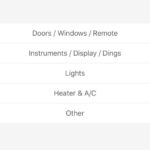Diagnosing your car issues at home can save you time and money. For Honda Civic owners, an OBD2 scanner is an invaluable tool for understanding those pesky check engine lights and other potential problems. However, sometimes connecting an OBD2 scanner to your Honda Civic isn’t as straightforward as it should be. If you’re experiencing trouble linking your OBD2 scanner to your Honda Civic, particularly a model around the 2006 generation, you’re not alone. This article will guide you through troubleshooting steps and help you find the best OBD2 scanner for your Honda Civic to ensure you can effectively read diagnostic codes and monitor your vehicle’s health.
Many Honda Civic owners, especially those with models from the mid-2000s, have encountered difficulties getting generic OBD2 scanners to connect. You might be following the standard procedure: plugging in the scanner with the car off, turning the ignition to ‘on’ without starting the engine, and then powering on the scanner to initiate the link. Despite these steps, the connection may fail, leaving you frustrated and without the diagnostic information you need. Some users even find that scanners that work on other vehicles fail to connect to their Honda Civic, leading to questions about compatibility and scanner functionality.
If you’re facing this connectivity issue with your Honda Civic Obd2 Scanner, consider these troubleshooting steps before assuming your scanner is faulty:
- Verify Scanner Functionality on Another Vehicle: Before focusing solely on your Honda Civic, test your OBD2 scanner on a different OBD2-compliant vehicle. This will help you determine if the scanner itself is working correctly. If it also fails to connect to another car, the scanner may indeed be defective or incompatible, regardless of its advertised OBD2 and CAN compliance.
- Check the OBD2 Port: Locate the OBD2 port in your Honda Civic. It’s typically found under the dashboard on the driver’s side. Inspect the port for any physical damage, debris, or bent pins that could prevent a proper connection. A visual inspection can sometimes reveal obvious issues.
- Ignition Timing: Ensure you are turning the ignition to the correct ‘on’ position – the position right before starting the engine. This position activates the car’s computer systems without engaging the starter. Try different ignition timings; some vehicles might require the ignition to be on for a few seconds before connecting the scanner.
- Scanner Power: Confirm your OBD2 scanner is receiving power. Most scanners will have a power indicator light. If it’s battery-powered, ensure the batteries are fresh or fully charged. If it’s powered by the OBD2 port itself, a faulty port could also mean no power to the scanner.
- CAN Compliance: While most modern OBD2 scanners are CAN compliant (Controller Area Network), which is the communication protocol used by most post-2008 vehicles and many earlier models including some Honda Civics of the era, double-check your scanner’s specifications. An older or very basic scanner might not fully support CAN, leading to connection issues with your Honda Civic.
An OBD2 port is typically located under the dashboard on the driver’s side of most vehicles.
If you’ve gone through these steps and your scanner still refuses to link with your Honda Civic, it might be time to consider a scanner that is known to work reliably with Honda vehicles, especially models from the 2000s. When looking for a new OBD2 scanner for your Honda Civic, consider these features:
- Honda Civic Compatibility Confirmation: Some scanner manufacturers explicitly list vehicle compatibility. Look for scanners that specifically mention Honda Civic models around the 2006 year or the relevant generation. Online reviews and forums can also provide user feedback on scanner compatibility with specific Honda models.
- Code Definitions: A crucial feature is the ability to display not just the code itself (like P0420) but also a text description of what the code means (e.g., “Catalyst System Efficiency Below Threshold”). This eliminates the need to look up codes separately and speeds up the diagnostic process.
- Monitor Status Check: This feature allows you to check the status of various emissions monitors (like oxygen sensors, catalytic converter, EVAP system). This is important for confirming if your car is ready for emissions testing and for diagnosing intermittent issues.
- Real-time Data (Live Data): The ability to display real-time operating parameters (like engine temperature, RPM, sensor readings) is invaluable for diagnosing driveability problems and understanding what’s happening while the car is running.
- Manufacturer-Specific Codes: While all OBD2 scanners read generic OBD2 codes, some advanced scanners can also read manufacturer-specific codes. These codes can provide more detailed diagnostics for Honda systems beyond the standard emissions-related codes. If you want to delve deeper into Honda-specific issues, this feature is highly beneficial.
- Update Capability: Scanners that can be updated ensure they remain compatible with newer vehicles and have the latest code definitions. This extends the lifespan and usefulness of your scanner.
For Honda Civic owners seeking a reliable OBD2 scanner, consider models that are praised for their compatibility with Asian makes and offer the features listed above. While “cheaper is better” is a common desire, investing in a mid-range scanner with good reviews and the necessary features will likely save you frustration and provide more effective diagnostics in the long run. Brands known for their reliability and comprehensive features in the DIY automotive diagnostic space are worth exploring.
In conclusion, troubleshooting an OBD2 scanner connection issue with your Honda Civic involves systematically checking the scanner, the car’s OBD2 port, and the connection procedure. If you determine the issue is scanner compatibility, focusing on scanners known to work well with Honda vehicles and equipped with essential features like code descriptions and live data will lead you to the right tool for effectively diagnosing and maintaining your Honda Civic.
